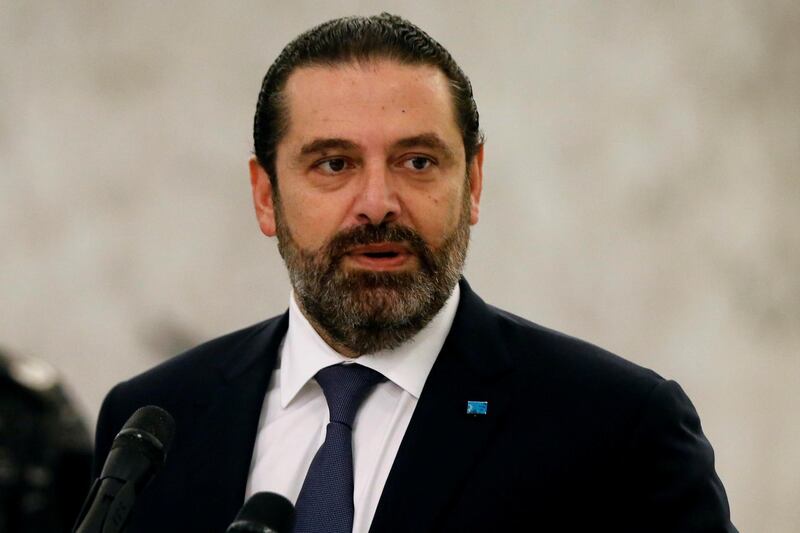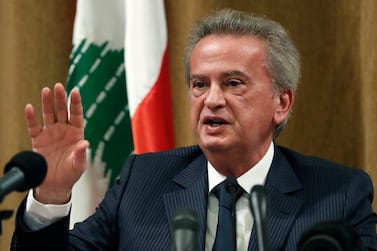Lebanon's caretaker prime minister Saad Hariri reached out to the heads of the International Monetary Fund and the World Bank as the impasse puts the country on the precipice of an economic meltdown
Mr Hariri “expressed to [World Bank president David] Malpass and [IMF Managing Director Kristalina] Georgieva his commitment to prepare an urgent rescue plan to address the crisis, while awaiting the formation of a new government capable of implementing it,” a statement from his office said.
Mr Hariri also discussed with both organisation heads “technical assistance that both the World Bank and the IMF can provide for the preparation of this plan”.
The calls to the organisations came as rating agencies Moody’s and Fitch warned on Thursday of a deterioration in the status of Lebanon’s top banks, which underpin the economic fabric of the country, following instructions by the central bank to reduce interest rates on foreign and local currency deposits.
Moody’s downgraded the standalone Baseline Credit Assessments (BCAs) and Adjusted BCA of Bank Audi, Blom Bank and Byblos Bank to ca from caa2 and said the emergency directive by the central bank “constitutes a deposit default”.
Fitch downgraded Bank Audi and Byblos Bank’s long- and short-term issuer default ratings to restricted default status from CCC- and 'C' respectively. Fitch also downgraded the banks' viability ratings (VR) to f from ccc-. The central bank’s instructions represent “a material reduction in terms compared with the original contractual terms of banks' financial obligations”, Fitch said and meet its definition of a restricted default
Lebanon is facing its worst financial crisis since the end of a 15-year civil war in 1990. On December 4 the central bank instructed banks to cut interest rates on dollar and Lebanese pound deposits by half. It also put in place a six-month cap of 5 per cent for local currency deposits received on or renewed after December 4.
Lebanon has been gripped by nationwide protests for the past two months with citizens demanding reforms and changes in the political system that has governed the country since the end of the last civil war. The protests are the largest the country has seen since the assassination of former prime minister Rafik Hariri in 2005, which led to Syria withdrawing its troops from Lebanon after a 29-year presence there.
Citizens blame Lebanon’s political elite for widespread corruption and nepotism, which they say contributed to the country accruing $86 billion (Dh315.6bn) of public debt equivalent to 150 per cent of gross domestic product, one of the highest ratios globally.
The crisis has led to the Lebanese pound losing about 20 per cent of its value against the US dollar in the local black market.
In an October 18 interview with The National, Jihad Azour, the director of the Middle East and Central Asia department at the IMF, said the fund would review an aid package proposal to help Lebanon if the country requests it.
The crisis has led to the Lebanese pound losing about 20 per cent of its value against the US dollar in the local black market. An IMF bailout package could devalue the currency and require the strict implementation of delayed structural reforms in tandem with austerity measures that are tied to the disbursement of any funds. Though central bank governor Riad Salameh said in November, there are no plans to impose capital controls or a haircut on depositors, some in the country are calling for a haircut on deposits.
A haircut is a financial term used to describe a devaluation of an asset to provide a cushion to lenders. In 2011 depositors of banks in Cyprus, exposed to the Greek debt crisis, lost as much as 60 per cent of their uninsured deposits on balances of more than €100,000 (Dh408,000). The measure was a requirement at the time for Cyprus to secure a €10bn bailout from the EU.
Lebanon needs to pay $1.2bn due in March when a Eurobond hits maturity. Another $700m are due in April and $600m in June. The crisis has increased the yield on the country’s bonds threefold.
Lebanon’s economy is forecast to slow down to 0.2 per cent this year from 0.3 per cent in 2018 due to increased uncertainty, tightening monetary policy and a contracting real estate sector, according to fund projections.








